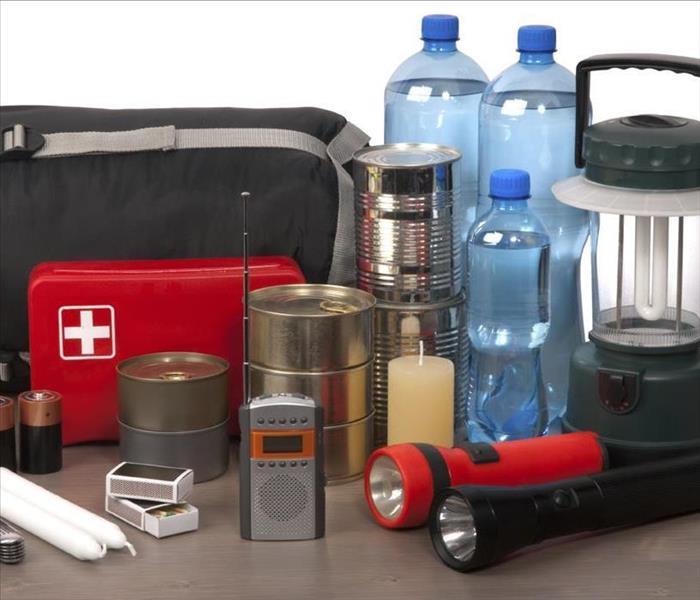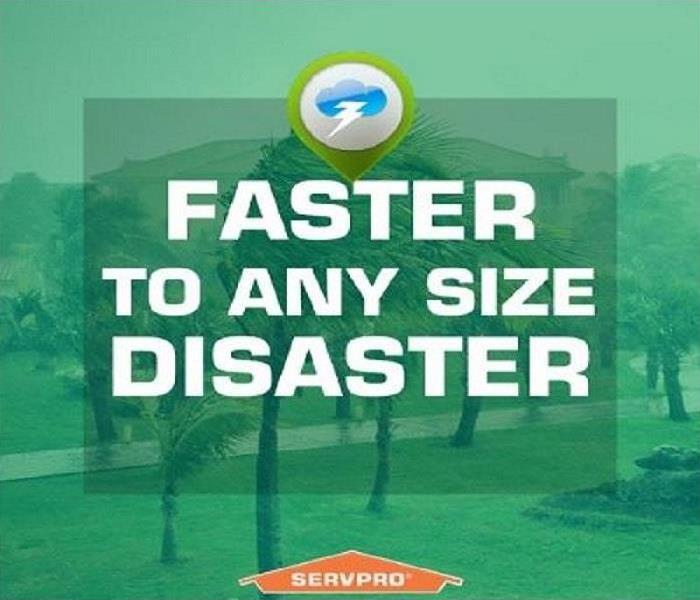Archived Community Blog Posts
Is Your Home Prepared for a Power Outage?
6/27/2018 (Permalink)
 Are You Prepared for a Power Outage?
Are You Prepared for a Power Outage?
You may need to survive on your own after an emergency. This means having your own food, water and other supplies in sufficient quantity to last for at least 72 hours. Local officials and relief workers will be on the scene after a disaster but they cannot reach everyone immediately. You could get help in hours or it might take days. Depending on the nature of the disaster road conditions may prevent help from arriving in a timely manner.
Additionally, basic services such as electricity, gas, water, sewage treatment and telephones may be cut off for days or even a week, or longer. Your supplies kit should contain items to help you manage during these outages. If the power goes out keep your pipes from freezing by shutting off the valve that allows water to come into your home. Then, open any drain valves and all faucets and let them run until the pipes are empty (it's helpful to identify these valves in advance). Next, flush all toilets and pour denatured alcohol into toilets and sinks to prevent water in the traps from freezing. Do NOT use automotive antifreeze in case there's trouble with your water system; you don't want the antifreeze to contaminate your drinking water. You may, however, use nontoxic antifreeze that's made for winterizing motor homes.
Be prepared for a power outage by keeping necessary items centrally located in your home. Take the time to ensure that everyone in your family is aware of the "kit." Periodically check your kit to see that batteries operate properly. The following is a list of items that are suggested to keep on hand:
1. Flashlights for each family member
2. Battery-operated radio and clock
3. Extra batteries
4. Containers of bottled water
5. Canned, freeze-dried or dehydrated food, powdered milk, baby supplies for infants
6. Non-electric can opener
7. List of important phone numbers
8. First-aid kit
Following a disaster, there may be power outages that could last for several days. Stock canned foods, dry mixes and other staples that do not require refrigeration, cooking, water or special preparation. Be sure to include a manual can opener and eating utensils. The following items are suggested when selecting emergency food supplies. You may already have many of these on hand.
•Store at least a three-day supply of non-perishable food.
•Choose foods your family will eat.
•Remember any special dietary needs.
•Avoid foods that will make you thirsty.
•Choose salt-free crackers, whole grain cereals and canned foods with high liquid content.
•Ready-to-eat canned meats, fruits, vegetables and a can opener
•Protein or fruit bars
•Dry cereal or granola
•Peanut butter
•Dried fruit
•Nuts
•Crackers
•Canned juices
•Non-perishable pasteurized milk
•High energy foods
•Vitamins
•Food for infants
•Comfort/stress foods
These and many other helpful tips are available at ready.gov Here is the link to winter tips for before during and after a severe weather event; www.ready.gov/severe-weather. When severe storms strike Florida’s First Coast, knowing what to do until SERVPRO of The Beaches/Ponte Vedra arrives will make a difference. Contact us at 904-246-6118.
First Coast Blessings in a Backpack
6/11/2018 (Permalink)
 Pictured is Walmart Manager Sedrick, located at Kernan and Atlantic Blvd., presenting a check for $2000 to First Coast Blessings in a Backpack.
Pictured is Walmart Manager Sedrick, located at Kernan and Atlantic Blvd., presenting a check for $2000 to First Coast Blessings in a Backpack.
Tom and Robin Braddock, owners of SERVPRO of The Beaches/Ponte Vedra, both serve on the board and volunteer for First Coast Blessings in a Backpack. First Coast Blessings in a Backpack helps local Title 1 elementary school children in Duval, St. Johns, and Clay counties, that are on free and reduced lunch, have healthy food over the weekend. Two entrees, snacks, and breakfasts are included in their Friday bags to take home. Many studies have been done showing that when young children stress about adult issues, such as struggling to provide food for themselves, or coming to school hungry, they have a hard time focusing on learning. Blessings in a Backpack takes this burden off of children and their hardworking, often single parents. All the money donated stays local, and goes to twelve schools in our area. Help us fight child hunger, so these kids can focus on learning and just being kids. To learn more about our local chapter of Blessings in a Backpack visit: http://www.firstcoastblessingsinabackpack.com/.
4 Essential Steps of Disaster Rehabilitation and Recovery
6/28/2017 (Permalink)
 Faster to Any-Sized Disaster
Faster to Any-Sized Disaster
Natural disasters can be terrifying, especially if they affect your home and your loved ones. Although it’s scary to think about, there are a wide variety of different catastrophes that could strike your home, including floods, hurricanes, tornadoes, fires, and more. If one of these unfortunate events does happen, you don’t want to find yourself unprepared! Discover the most important steps to take following a major disaster so you and your family are able to recover quickly and safely.
1. Assess the Situation
As soon as the calamity has died down, check yourself and any family members to make sure no one is hurt. If you have any nearby neighbors, see if they are in need of any help. Turn off the gas and electricity in your home if it safe to do so, and avoid entering your home for a while, as there could be damage to your floors or ceilings that could cause them to collapse.
2. Finding Food and Shelter
Food and water are vital for keeping your strength up, so start your search for necessities as soon as you can. If your home no longer has running water, you can obtain it through emergency sources, such as rainwater, your hot water tank, your toilet reservoir, or ice cube trays. If you have food that needs to be cooked, you can cook it over a fire in your chimney or use a grill outside. Shelters are usually assembled by the American Red Cross in emergency situations for those whose homes are too damaged to stay in; look for one of these if you feel your home is dangerous. The Federal Emergency Management Agency, as well as local churches and community services, are also good resources for any needs you might have in these dire situations.
3. Be Cautious
Disasters always leave a trail of destruction behind; be wary of contaminated floodwaters, fallen power lines, or any criminals taking advantage of all the chaos. Don’t turn the gas back on in your home, as there could be a leak, and make sure your house is ventilated if you’re cooking over your fireplace.
4. Recovering Important Information
One of the last steps of disaster rehabilitation and recovery is to salvage as many of the important documents from the wreckage, such as your insurance policies, birth certificates, driver’s license, deeds, wills, financial statements, and any other precious information. Although these procedures might be difficult, it will help you and your family recover from this crisis as quickly as possible.
Call SERVPRO of The Beaches/Ponte Vedra with all Your Disaster Rehabilitation Needs!
If a disaster has affected your home, call SERVPRO of The Beaches/Ponte Vedra for all your cleanup needs! Our disaster restoration services are available 24/7, 365 days per year; they include water and flood damage cleanup, mold remediation, odor control, reconstruction services, trauma cleanup, and fire and smoke damage cleanup. Don’t wait another moment if your home has been devastated; call us today at 904-246-6118.
Hurricane Season is Here! 5 Preparedness Tips to do today!
6/12/2017 (Permalink)
Hurricane season has arrived and SERVPRO of The Beaches/Ponte Vedra has preparedness steps that families and individuals can do today, before the next storm approaches.
While the National Oceanic and Atmospheric Administration (NOAA) predicted a near-normal 2016 Atlantic hurricane season with 10 to 61 named storms, it is important to remember that it only takes one hurricane to devastate a community. In addition, caution cannot be limited to coastal states. Hurricanes can be just as destructive for inland communities.
5 Hurricane Preparedness Tips to Tackle Today
1. Download the Red Cross Emergency App.
This new app provides expert advice on what to do before, during, and after hurricanes and other disasters. It also gives instant access to 35 customizable weather alerts, safety tips and preparedness information for 14 different emergencies; all in one free and easy to use app
2. Learn the difference between a Hurricane Watch and a Hurricane Warning.
As hurricane season approaches, it is also important to know the difference between the threat levels.
- A Hurricane Watch is when conditions are a threat within 48 hours. It’s then time to review and update your hurricane plan. Get ready to act if a warning is issued, and stay informed.
- A Hurricane Warning is when conditions are expected within 36 hours. It’s then time to complete your storm preparations and leave the area if directed to do so by authorities.
3. Create an evacuation plan for your family.
Planning and practicing your evacuation plan minimizes confusion and fear during the event. Find out about your community’s hurricane response plan. Plan routes to local shelters, register family members with special medical needs and make plans for your pets to be cared for. Obey evacuation orders. Avoid flooded roads and washed out bridges.
4. Build an emergency kit.
The Red Cross advises that you should include a gallon of water per person, per day, non-perishable food, a flashlight, battery-powered radio, first aid kit, medications, supplies for an infant if applicable, a multi-purpose tool, personal hygiene items, copies of important papers, cell phone chargers, extra cash, blankets, maps of the area and emergency contact information.
5. Pay attention to the weather forecast and stay informed.
Listen to a NOAA Weather Radio or critical information from the National Weather Service (NWS)
6. Download the SERVPRO Ready Plan App.
This is an invaluable tool if you own a home or commercial building. The SERVPRO Ready Plan App is a part of the SERVPRO Emergency Ready Profile which is a start up approach that provides critical information needed to begin mitigation and recovery services.
SERPVRO of The Beaches/Ponte Vedra provides emergency service 24/7/365. Our team of professionals are committed to providing fire, water and bio-hazard cleanup and restoration services for all Jacksonville Beach and Ponte Vedra communities and business. SERVPRO of The Beaches/Ponte Vedra also offers top-quality professional cleaning services for all Jacksonville Beache and Ponte Vedra homes and businesses. Call us anytime and speak to a SERVPRO professional and NOT a recording, at 904-246-6118.





 24/7 Emergency Service
24/7 Emergency Service

